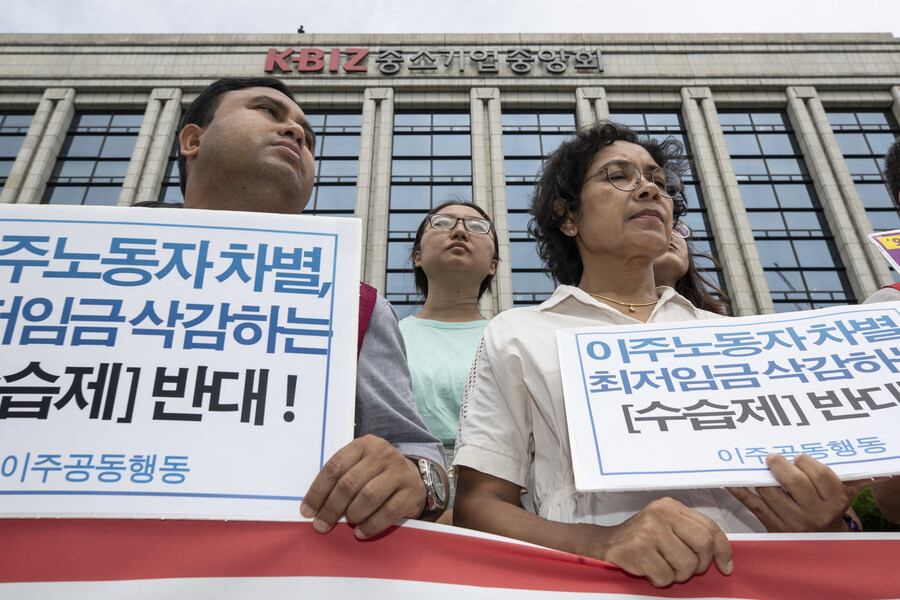hankyoreh
Links to other country sites 다른 나라 사이트 링크
Migrant workers denounce attempts by businesses to reduce their minimum wage

“Small and medium-sized companies that couldn’t operate for a single day without migrant workers are shamelessly demanding that their wages be cut. In other words, they need the workers but aren’t willing to pay them a decent wage,” said Migrants’ Trade Union President Udaya Rai during a press conference held on the morning of Aug. 23 in front of the office of the Korea Federation of SMEs (KBIZ), in Seoul’s Yeongdeungpo District.
“The demands by the Korea Federation of SMEs and other groups to create a separate minimum age for migrant workers clearly constitute racial discrimination,” Rai said.
The Migrants’ Trade Union held the press conference together with the Korean Confederation of Trade Unions (KCTU) to protest the continuing efforts by the business community and conservative parties to reduce the minimum wage for migrant workers.
Participants in the press conference attempted to deliver a letter of protest to KBIZ, but they were blocked by the police, leading to a scuffle that lasted for 20 minutes in front of the building entrance.
The calls for a separate minimum wage for migrant workers began around the time that the minimum wage controversy broke out. On Aug. 16, KBIZ met with SMEs and Startups Minister Hong Jong-hak and suggested that a separate training period be created for migrant workers during which the minimum wage could be lowered as far as 80 percent.
According to a revision of the Minimum Wage Act in Sept. 2017, workers must still be paid the full minimum wage even when they’re in a training period or doing repetitive work, but KBIZ wanted an exception to be made for migrant workers. Hong responded to this proposal by promising to “seriously consider it.”
Similar things have been happening at the National Assembly. On July 30, KBIZ made the same demands during a visit to the National Assembly’s Environment and Labor Committee. Responding to KBIZ’s demands, Rep. Kim Hak-yong, a lawmaker with the Liberty Korea Party who chairs the committee, submitted a bill on Aug. 10 that would revise the Minimum Wage Act. The language of the proposed revision would make it possible to set a different minimum wage for the first two years after migrant workers start repetitive work or a training period.
The Migrants’ Labor Union is fighting back by arguing that the attempts by KBIZ and other groups are not only unlawful, but even racially discriminatory. Article 6 of the Labor Standards Act prohibits any discrimination in working conditions on the grounds of nationality, belief and social status. Convention 111 of the International Labor Organization (Convention Concerning Discrimination in Respect to Employment), which South Korea ratified in Dec. 1998, also bans member states from wage discrimination based on nationality.
“It’s astonishing that these attempts to pervert the minimum wage – efforts that run afoul of the Labor Standards Act – began with migrant workers, who are the most vulnerable of all minimum wage workers,” said Bong Hye-yeong, vice chair of the KCTU.
“The discriminatory application of the minimum wage on the pretext of falling productivity may begin with migrant workers, but it would gradually extend to Koreans as well,” said Na Hyeon-pil, secretary-general for the Korean House for International Solidarity.
By Lee Ji-hae, staff reporter
Please direct comments or questions to [english@hani.co.kr]

Editorial・opinion
![[Column] Park Geun-hye déjà vu in Yoon Suk-yeol [Column] Park Geun-hye déjà vu in Yoon Suk-yeol](https://flexible.img.hani.co.kr/flexible/normal/500/300/imgdb/original/2024/0424/651713945113788.jpg) [Column] Park Geun-hye déjà vu in Yoon Suk-yeol
[Column] Park Geun-hye déjà vu in Yoon Suk-yeol![[Editorial] New weight of N. Korea’s nuclear threats makes dialogue all the more urgent [Editorial] New weight of N. Korea’s nuclear threats makes dialogue all the more urgent](https://flexible.img.hani.co.kr/flexible/normal/500/300/imgdb/original/2024/0424/7317139454662664.jpg) [Editorial] New weight of N. Korea’s nuclear threats makes dialogue all the more urgent
[Editorial] New weight of N. Korea’s nuclear threats makes dialogue all the more urgent- [Guest essay] The real reason Korea’s new right wants to dub Rhee a founding father
- [Column] ‘Choson’: Is it time we start referring to N. Korea in its own terms?
- [Editorial] Japan’s rewriting of history with Korea has gone too far
- [Column] The president’s questionable capacity for dialogue
- [Column] Are chaebol firms just pizza pies for families to divvy up as they please?
- [Column] Has Korea, too, crossed the Rubicon on China?
- [Correspondent’s column] In Japan’s alliance with US, echoes of its past alliances with UK
- [Editorial] Does Yoon think the Korean public is wrong?
Most viewed articles
- 1‘We must say no’: Seoul defense chief on Korean, USFK involvement in hypothetical Taiwan crisis
- 2N. Korean delegation’s trip to Iran shows how Pyongyang is leveraging ties with Moscow
- 346% of cases of violence against women in Korea perpetrated by intimate partner, study finds
- 4Amnesty notes ‘erosion’ of freedom of expression in Korea in annual human rights report
- 5‘Weddingflation’ breaks the bank for Korean couples-to-be
- 6[Column] Park Geun-hye déjà vu in Yoon Suk-yeol
- 7Will NewJeans end up collateral damage in internal feud at K-pop juggernaut Hybe?
- 8Korea sees more deaths than births for 52nd consecutive month in February
- 9“Parental care contracts” increasingly common in South Korea
- 10[Interview] Dear Korean men, It’s OK to admit you’re not always strong